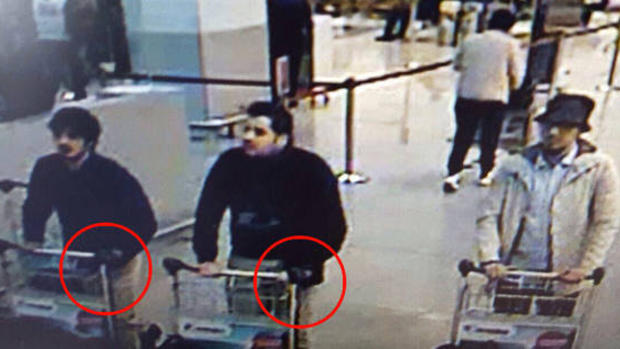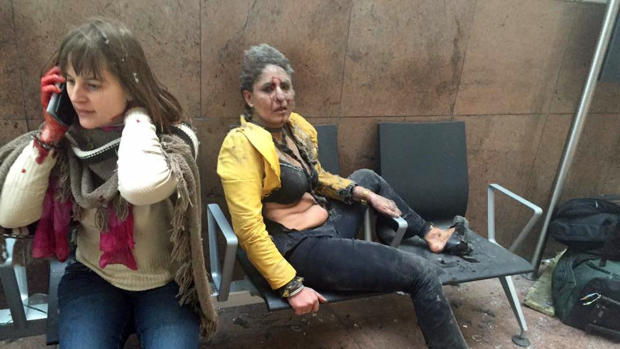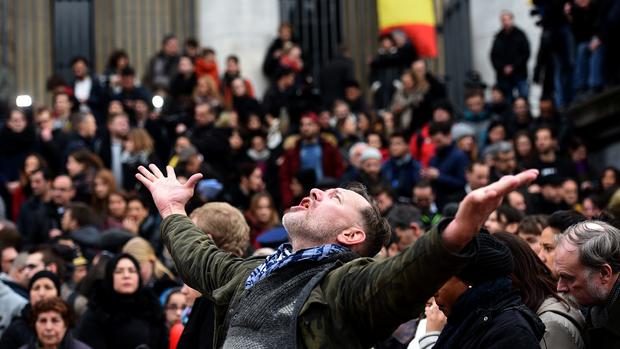Brussels attacks: Photo, wanted notice released for suspect
BRUSSELS -- As the Islamic State of Iraq and Syria (ISIS) claimed responsibility for the deadly attacks at the Brussels airport and one of the city's metro stations, police in Belgium issued a wanted notice for a suspect in the airport bombing while conducting raids across the country searching for clues and possible suspects.
A man wearing a thick light-colored jacket with a black hat and glasses is suspected of being a perpetrator who survived the attack at Zaventem airport on Tuesday morning.
Police are urging the public to call them if they recognize the suspect, tweeting the image of the suspect with a message: "Who recognizes this man?"
Authorities also released a photo taken from closed-circuit TV of three men pushing luggage carts, saying two of them apparently were the suicide bombers and that the third man, on the far right, was at large.
A U.S. intelligence official told CBS News senior investigative producer Pat Milton that U.S. investigators believe that each of two presumed attackers may have been wearing a glove on one hand to hide the detonator to set off the explosive device.
The official said that wearing a glove is common to hide hand-controlled detonators.
At least 31 people were killed in the terrorist attacks in the city, which has been on high alert since the Paris carnage last year.
ISIS has issued an updated communique taking credit for the Brussels attacks and threatening other countries taking part in the anti-ISIS coalition.
The statement promises "dark days" for countries allied against ISIS, threatening that "what is coming is worse and more bitter."
The communique was published in Arabic and French, and an English translation was provide by the SITE Intelligence Group, which monitors jihadi websites.
ISIS also released photos purportedly showing its fighters in Syria giving out candy to children to celebrate the Brussels attacks, according to SITE.
Police later conducted raids in Brussels searching for one of the suspects, and found a nail-filled bomb, chemical products and an ISIS flag in the search of a house in the Schaerbeek neighborhood, the state prosecutors' office said in a statement.
An ISIS posting in the group's Amaq news agency said its extremists opened fire in the airport and "several of them" detonated suicide belts. Another suicide attacker detonated in the metro.
Two sources confirmed to CBS News that a Kalashnikov assault rifle was found in the airport terminal, and Florence Muls, a spokeswoman for the Brussels Airport, says a bomb had been neutralized at the airport.
The posting claimed the attack was in response to Belgium's support of the international coalition arrayed against it. Another ISIS statement posted online threatened more attacks against countries staking part in the coalition in Syria and Iraq.
"We promise the countries taking part in the coalition against the Islamic State that they will see black days in response to their aggression against the Islamic State," the statement said. "What's yet to come is worse and more bitter."
Belgium's interior minister said authorities knew that some kind of extremist act was being prepared in Europe but that they were surprised by the scale of the attacks in Brussels.
Interior Minister Jan Jambon said Tuesday that "it was always possible that more attacks could happen but we never could have imagined something of this scale."
Jambon told RTL television that "we had no information about this, but we know that things were moving in Europe, in different countries, in France, in Germany, here."
He said the Belgian authorities have no information about the planning of "any kind of action in Brussels at this time."
A U.S. official told CBS News that at least 11 people were killed and dozens injured in the blasts in the departure hall at Brussels Airport.
About an hour after the airport blasts, another bomb exploded on a rush-hour subway train near the European Union headquarters. Terrified passengers had to evacuate through darkened tunnels to safety.
The mayor of Brussels said at least 20 people died in the Maelbeek Metro attack. Dozens more were left wounded.
"What we feared has happened," Belgian Prime Minister Charles Michel told reporters. "In this time of tragedy, this black moment for our country, I appeal to everyone to remain calm but also to show solidarity."
Belgium raised its terror alert to the highest level, diverting planes and trains and ordering people to stay where they were. Airports across Europe immediately tightened security.
"We are at war," French Prime Minister Manuel Valls said after a crisis meeting in Paris. "We have been subjected for the last few months in Europe to acts of war."
Added French President Francois Hollande: "Terrorists struck Brussels, but it was Europe that was targeted."
European security officials have been bracing for a major attack for weeks, and warned that ISIS was actively preparing to strike. The arrest Friday of Salah Abdeslam, a key suspect in the November attacks in Paris, heightened those fears, as investigators said many more people were involved than originally thought and that some are still on the loose.
Former Deputy Director of the CIA Michael Morell, now a senior CBS News security contributor, said the attacks were likely planned and could have been "accelerated" by the arrest of Abdeslam.
"This particular attack, I believe, was something that they had in train... He (Abdeslam) was probably aware of this. They were probably concerned that he was going to talk to authorities and they moved this up," Morell said on "CBS This Morning."
Michel said there was no immediate evidence linking them with Abdeslam. After his arrest, Abdeslam told authorities he had created a new network and was planning new attacks.
U.S. President Barack Obama pledged to "do whatever is necessary" to help Belgian authorities seek justice.
"We stand in solidarity with them in condemning these outrageous attacks against innocent people," Obama said in Havana, where he was closing a three-day visit.
Western Europe has lived for decades under the threat of violence from homegrown nationalist and revolutionary movements. Muslim extremists from North Africa and the Middle East have attacked civilian targets without warning, ranging from France's 1960s war in Algeria through Libya's 1988 downing of an airline over Scotland to the 2004-05 attacks on the public transportation systems of London and Madrid.
Certain neighborhoods in Brussels, like the Molenbeek quarter, have bred extremists and supplied foreign fighters. Plotters linked to the Paris attacks, and other strikes over at least the last several decades, have either moved through or lived in parts of the city.
The U.N. Security Council has strongly condemned the Brussels attacks and urging intensified regional and international efforts "to overcome terrorism and violent extremism."
A statement approved by the U.N.'s most powerful body expressed solidarity with Belgium and underlined the need to bring those responsible for "these reprehensible acts of terrorism to justice."
The Security Council again urged all countries to combat "terrorist acts" and take measures to prevent and stop the financing "of terrorism, terrorist organizations and individual terrorists."
U.N. Secretary-General Ban Ki-moon also strongly condemned the attacks and expressed confidence "that Belgium's and Europe's commitment to human rights, democracy and peaceful coexistence will continue to be the true and lasting response to the hatred and violence of which they became a victim today," his spokesman said.
Tuesday's explosions at the airport in the Brussels suburb of Zaventem came shortly after 8 a.m., one of its busiest periods. Belgian Health Minister Maggie de Block said 11 people were killed and 81 wounded. Eleven people had serious injuries, Marc Decramer of the Gasthuisberg hospital in Leuven told broadcaster VTM. The nails apparently came from one of the bombs.
Zach Mouzoun, who arrived on a flight from Geneva about 10 minutes before the first blast, told BFM television that the second, louder explosion brought down ceilings and ruptured pipes, mixing water with victims' blood.
"It was atrocious. The ceilings collapsed," he said. "There was blood everywhere, injured people, bags everywhere."
"We were walking in the debris. It was a war scene," he said.
Video taken moments after the explosions showed travelers huddled next to airport check-in counters and lying near luggage and trolleys as dust and the cries of the wounded filled the air. Dazed people stumbled from the scene, some with clothes and shoes blown off.
Anthony Deloos, an airport worker for Swissport, which handles check-in and baggage services, said the first explosion took place near the Swissport counters where customers pay for overweight baggage. He and a colleague said the second blast hit near a Starbucks cafe.
"I jumped into a luggage chute to be safe," Deloos said.
The bomb on the subway train came after 9 a.m., killing 20 people and wounding more than 100, Mayor Yvan Majeur said.
"The metro was leaving Maelbeek station for Schuman when there was a really loud explosion," said Alexandre Brans, 32, wiping blood from his face. "It was panic everywhere. There were a lot of people in the metro."
Near the entrance to the station, rescue workers set up a makeshift medical treatment center in a pub. Dazed and shocked morning commuters streamed from the metro entrances as police tried to set up a security cordon.
The metro shut down after the attacks, as did the airport. More than 200 flights to Brussels were diverted or canceled, according to flight tracking service Flightradar24.
Travelers fled the airport as quickly as they could. In video shown on France's i-Tele television, men, women and children dashed from the terminal in different directions.
Marc Noel, 63, was about to board a Delta flight to Atlanta, to return to his home in Raleigh, North Carolina. A Belgian native, Noel said he was in an airport shop buying automotive magazines when the first blast struck about 50 yards away.
"People were crying, shouting - children. It was a horrible experience," he said, adding that his decision to shop might have saved his life. "I would probably have been in that place when the bomb went off."


